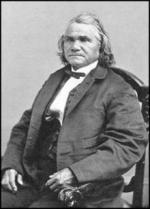Disable ads!
Stand Watie
Stand Watie Native name Degataga Born (1806-12-12)December 12, 1806 Calhoun, Georgia Died September 9, 1871(1871-09-09) (aged 64) Delaware County, Oklahoma Buried at Delaware County, Oklahoma Allegiance Confederate States of America Service/branch Confederate States Army Georgia Militia Years of service 1861–1865 (CSA) Rank Brigadier General (CSA) Commands held 1st Cherokee Mounted Rifles Battles/wars American Civil War Battle of Wilson's Creek Battle of Pea Ridge Battle of Prairie Grove Other work Principal Chief of the Cherokee Nation (1862–1866) Stand Watie (December 12, 1806 – September 9, 1871; also known as Standhope Uwatie, Degataga (Cherokee: ᏕᎦᏔᎦ), meaning "stand firm", and Isaac S. Watie) was a leader of the Cherokee Nation and a brigadier general of the Confederate States Army during the American Civil War. He commanded the Confederate Indian cavalry of the Army of the Trans-Mississippi, made up mostly of Cherokee, Muskogee and Seminole, and was the final Confederate general in the field to surrender at war's end. Prior to removal of the Cherokee to Indian Territory in the late 1830s, Watie and his older brother Elias Boudinot were among leaders who signed the Treaty of New Echota in 1835. The majority of the tribe opposed their action. In 1839 the brothers were attacked in an assassination attempt, as were other relatives active in the Treaty Party. All but Stand Watie were killed. Watie in 1842 killed one of his uncle's attackers, and in 1845 his brother Thomas Watie was killed in retaliation, in the continuing cycle of violence. Watie was acquitted at trial in the 1850s on the grounds of self-defense. During the American Civil War and soon after, Watie served as Principal Chief of the Cherokee Nation (1862–1866). By then, the majority of the tribe supported the Confederacy. A minority supported the Union and refused to ratify his election. The former chief John Ross, a Union supporter, was captured in 1862 by Union forces. Watie led the Southern Cherokee delegation to Washington after the war to sue for peace, hoping to have tribal divisions recognized. The US government negotiated only with the leaders who had sided with the Union, and named John Ross as principal chief in 1866 under a new treaty. Watie stayed out of politics for his last years, and tried to rebuild his plantation.
 Read more on wikipedia.org Read more on wikipedia.org
 All quotes by Stand Watie All quotes by Stand Watie
 Edit Edit
|

|
|
|
|
|
Background photo by Giuliana
|